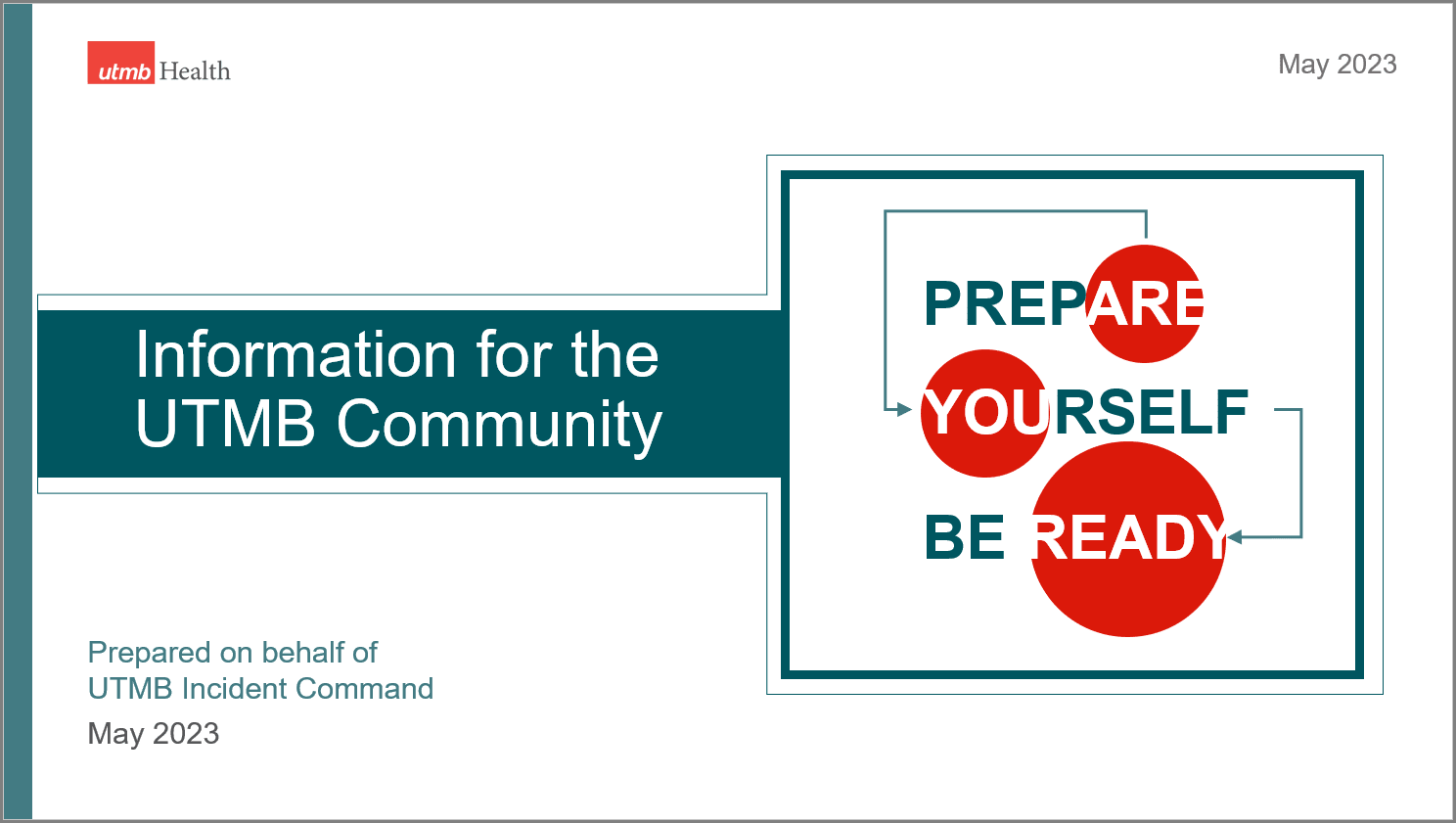2023 storm season planning and resources
Prepare now at home and work — before an emergency
Every year as hurricane season approaches, the Gulf Coast region goes into preparation mode. But we all know that emergencies affecting our work, families or homes can happen at any time and at any of our locations throughout the state.
Please review the following information on how UTMB prepares for and communicates during emergencies, and the list of actions you should take now to be ready at work and at home.
View our 2023 emergency preparedness presentation
(PDF Version)
Thank you for making personal safety a priority and also for your help keeping UTMB prepared for any emergency across the state.

What You Can Do Now
- Become familiar with your department’s emergency plan and your role in an emergency.
- Talk with your supervisor or faculty advisor about your emergency responsibilities and/or procedures for reporting to work/school during an emergency.
- Become familiar with UTMB’s Institutional Emergency Operations Plan (login required).
- Visit Employee Self Service/Personal Information (access via “Employee Self Serv/Paycheck” link on iUTMB) to check and update the following information, which is vital to our ability to determine who is affected by a particular emergency, on or off UTMB property:
- Your UTMB Directory information—particularly your work location (L-code)
- Your personal information, such as home address and home contact information
- Your emergency contacts (the family members or friends UTMB should contact if you become seriously ill or injured at work or if we are unable to reach you during a large-scale emergency)
- Check your contact and location information in the UTMB Alerts emergency notification system here (login required). Add your mobile number to receive UTMB Alerts messages via text and/or mobile phone call, to ensure you get notifications as quickly as possible. List a minimum of two contact methods.
- Keep computer security in mind. Never reveal your UTMB login information to anyone, and be suspicious of emails asking you to enter your login information.
- Wear your ID badge every day at all UTMB locations, so University Police, members of the public and, if needed, emergency responders will know you belong.
- Enroll in Direct Deposit and MyChart, to ensure access to both your paycheck and your UTMB medical records in an emergency.
- Develop an emergency plan for your home that takes into account care and safety of dependents and pets.
Emergency Response
In an emergency, UTMB activates its Incident Command structure to make decisions based on the specifics of the emergency as it develops. Led by an appointed Incident Commander and coordinating with other agencies when appropriate, the group determines UTMB’s response to the incident, including if and when to dismiss students and employees.
Communication
We communicate emergency response decisions in a variety of ways, depending on the type, geography, and severity of the emergency. These include:
- Email to targeted groups in each mission area
- Broadcast emails to all employees statewide as appropriate
- Alerts website
- iUTMB (UTMB network or VPN connection required)
- utmb.edu public home page as appropriate
- Social media, including I Am UTMB and UTMB Health pages on Facebook and @UTMBHealth on Twitter
- UTMB Alerts emergency notification service, as appropriate
- UTMB Safe app, managed by University Police and available in the Apple and Google app stores
- utmbhealth.com for patient-focused updates, as needed
Immediate Action Items (Before an Emergency)
- Remember to complete the required 2023 Employee Demographic and Emergency Classification Form (login required) and have it approved by your supervisor by June 2, 2023.
- Become familiar with your department’s emergency plan and your role in an emergency.
- Talk with your supervisor or faculty advisor about your emergency responsibilities and/or procedures for reporting to work/school during an emergency. This includes discussing any role you will have in the Emergency Labor Pool (login required) during a no-notice event.
- Become familiar with UTMB’s Institutional Emergency Operations Plan.
- Check your contact and location information in the UTMB Alerts emergency notification system (login required).
- Ensure you mobile number is listed correctly so you can receive UTMB Alerts messages via text and/or mobile phone call—the quickest ways to get notifications.
- List a minimum of two contact methods, including your mobile number.
- Visit Employee Self Service/Personal Information (access via “Employee Self Serv/Paycheck” link on iUTMB) to check and update the following information, which is vital to our ability to determine who is affected by a particular emergency, on or off UTMB property:
- Your UTMB Directory information—particularly your work location (L-code)
- Your personal information, such as home address and home contact information
- Your emergency contacts (the family members or friends UTMB should contact if you become seriously ill or injured at work or if we are unable to reach you during a large-scale emergency)
- Keep computer security in mind. Never reveal your UTMB login information to anyone and be suspicious of emails asking you to enter your login information.
- Wear your ID badge every day at all UTMB locations, so University Police, members of the public and, if needed, emergency responders will know you belong.
- Enroll in Direct Deposit and MyChart, to ensure access to both your paycheck and your UTMB medical records in an emergency.
- Develop an emergency plan for your home that includes care and safety of dependents and pets.
Resources
- Visit www.utmb.edu/emergency_plan to view the 2023 emergency preparedness presentation, checklists, related forms, emergency-related policies, and other important information.
- The HR Adverse Events Toolkit (login required) also provides a number of resources.
Thank you for making your personal safety a priority and for your help in keeping UTMB prepared for any emergency in any of our locations across the state.
